Hilary Mantel Interview: Romance
Peter Breedveld
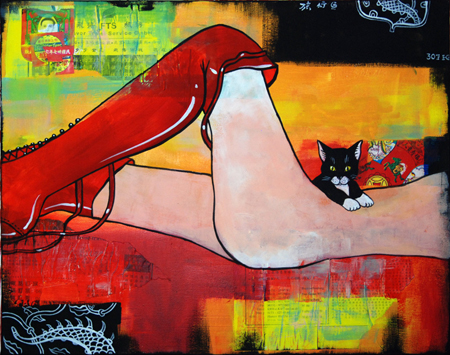
Illustratie: Yana Frank
You once made a radical decision to divorce your husband, only to remarry him later. That’s a very romantic event that woudn’t easily occur in one of your novels, I suspect.
“Then you should read Fludd, which ends very happily. It ends in people parting, but they part very happily, and having changed for the better.”
“But you’re right, in my books people try to solve their problems in a variety of drastic and decisive ways, like murder, (giggles), but again it’s to do with people changing. Vast changes take place in relationships. With the exception of the little time my husband and I were not together, we have been married for 35 years and it’s not one relationship, it’s like a series of relationships. I think the changes are fascinating, the fact that you’re always making yourself over. At one point we were unlucky because we were changing in different directions and at different speeds and it didn’t work. But then another change came, which did work. It’s a kind of evolutionary process. So I don’t see that couldn’t happen for people in my books.”
“But it’s true that I am not a writer of romantic stories. I haven’t written a love story, except perhaps for Fludd. Although Fludd is such a distinctive book that it would perhaps take the reader a long time to realise it’s a love story, because it seems to be many other things before you get to that point.”
“But that will change. I have a love story to write, a couple of books down the line. It doesn’t end very happily though.”
So tell me about the book you’re currently working on.
“Wolf Hall is a really big historical novel about, you know our monster king, Henry VIII, with his six wives. It’s not about Henry, but about his chief minister Thomas Cromwell. It’s a big researching project, as well as a writing project. I’m very at home with it. I love doing it. I know the book you’re working on at any given time tends to be your favourite, but this is a book I’ve enjoyed writing most, because in this book everything I’ve enjoyed to do is being pulled together. I am enjoying this book more than everything I have for quite a while.”
“It’s a difficult project, because this period in English history, so many novelists have written about it over the years. Usually in a very romantic way. But nobody has tackled it from the angle I am tackling it from. I hope it will be one of these novels that I was talking about, that gives the reader a world to live in during the time it takes to read.”
Do you do the research while you are writing, or have you first done all the necessary research and do you then start writing?
“I can’t do all the research first and then say that’s cut and dried. For instance, a lot of the books that I read and the sources that I consulted when I started this project I have to later consult again because I see them with more knowledge so you look at things differently altogether. And as you’re writing, questions arise and then you have to go and look for the answers. I don’t mean in the sense of what happened on the 17th of September, that stuff is easy, I mean the true story behind a story, the version behind the version. And above all, how does it feel, what is the experience from the inside.”
“It’s not written in the first person, but it’s very close third person. The camera is always on my character’s shoulder. So nothing happens that he doesn’t know about, that he doesn’t witness, so it’s always filtered through his consciousness. So again you try to recover the texture of experience. Not to do just the usual furnishings and trappings of that historical novel, but to go a bit deeper.”
You are very good at creating male characters, by the way. How do you do that?
“Kind of you to say. I never thought about it. When I started writing I started this big book about the French Revolution. It never occurred to me to choose female characters. I knew the characters I wanted to write about, so I just did it. I never thought about it as a problem and maybe it’s better not to start to think about it, because then it might become a problem, so it’s maybe better to cross ahead. I am a bit worried about this book more then I was with A Place of Greater Safety. Is this convincing for the male world, because I am centered on just this one character. So we’ll see. But you know, nobody said it’s going to be easy, you wouldn’t want it to be easy.”
One of the main characters in Everyday is Mother’s Day is a man, Colin, who cheats on his wife. It strikes me you take his side rather than that of the cheated, pregnant wife.
“What appealed to me about Colin is the vast gap between his aspirations and his reality. He is an educated man who really believes in love and in a more cultured life. And he’s being ground down by his one-dimensional family. What endears him to me is he is always hoping for something better. What he’s actually hoping for is a spiritual life. And all he’s got is the grinding reality of his work as a teacher. But he still keeps his ideals. I am so glad you say I am on his side, because nobody has ever made that observation about the book before. But yes, poor man, he’s doing his best and it’s not likely to be good enough.”
Has one of your books ever been made into a film?
“No, there have been a lot of attempts, a lot of options granted. Nothing as yet has come off, although BBC is developing Beyond Black for a three part television series. It’s being written at the moment, I don’t know when it will be out. But they have committed to it and I think it will happen. Other books have been opted at, but you know, it’s quite difficult to get a project started, things fall apart at different stages. But I don’t get involved, it’s just my job to create the primary product.”
You’re not co-writing the scripts?
“I have tried in the past. You realise you have to choose. A screenplay is going to take a year, eighteen months, that’s a novel that you’re not going to do. Ten years ago I was far more involved in it. I’ve also written radio-plays and I intend to continue to do that. I would like to write something for the theatre one day. But you have to let projects go. I’ve got novels clamouring to be written. Projects circling around my head as it were. I want to do them and I’m conscious of having to choose.
This is the fifth and final part of my big Hilary Mantel interview. See also the first, second, third and fourth part.

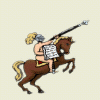
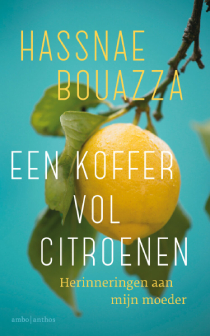
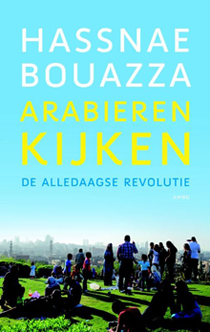
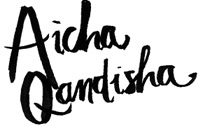
 RSS
RSS